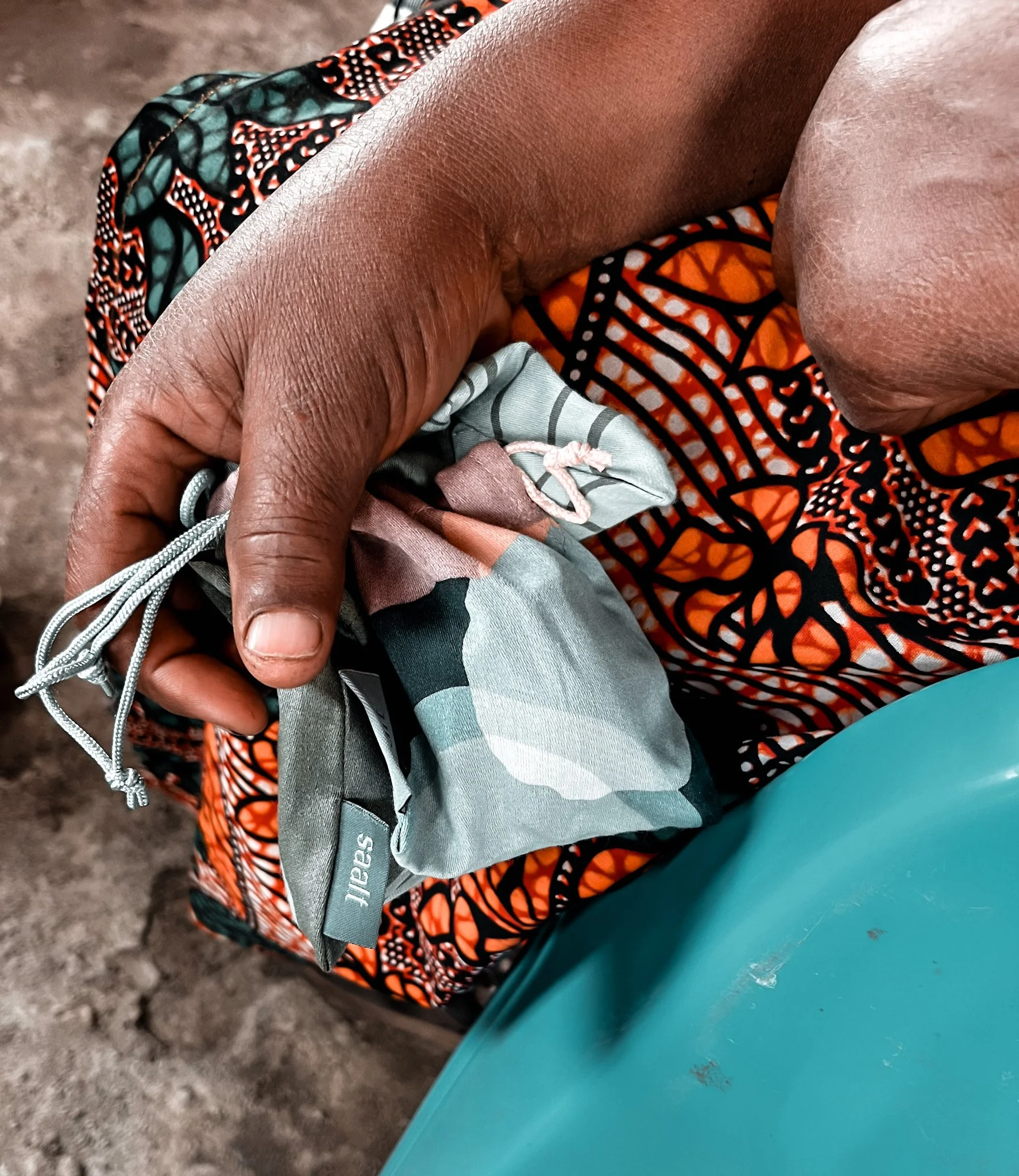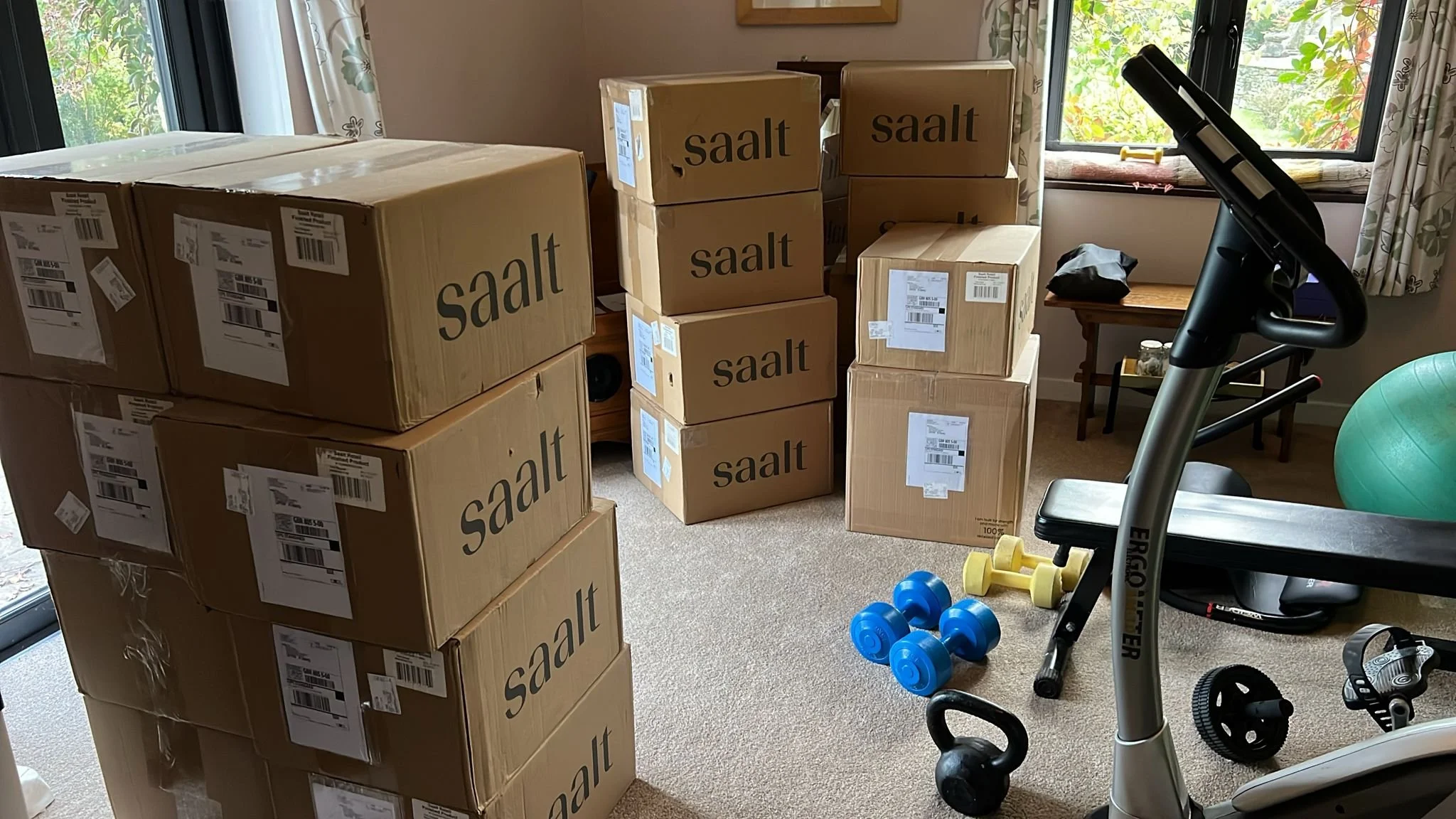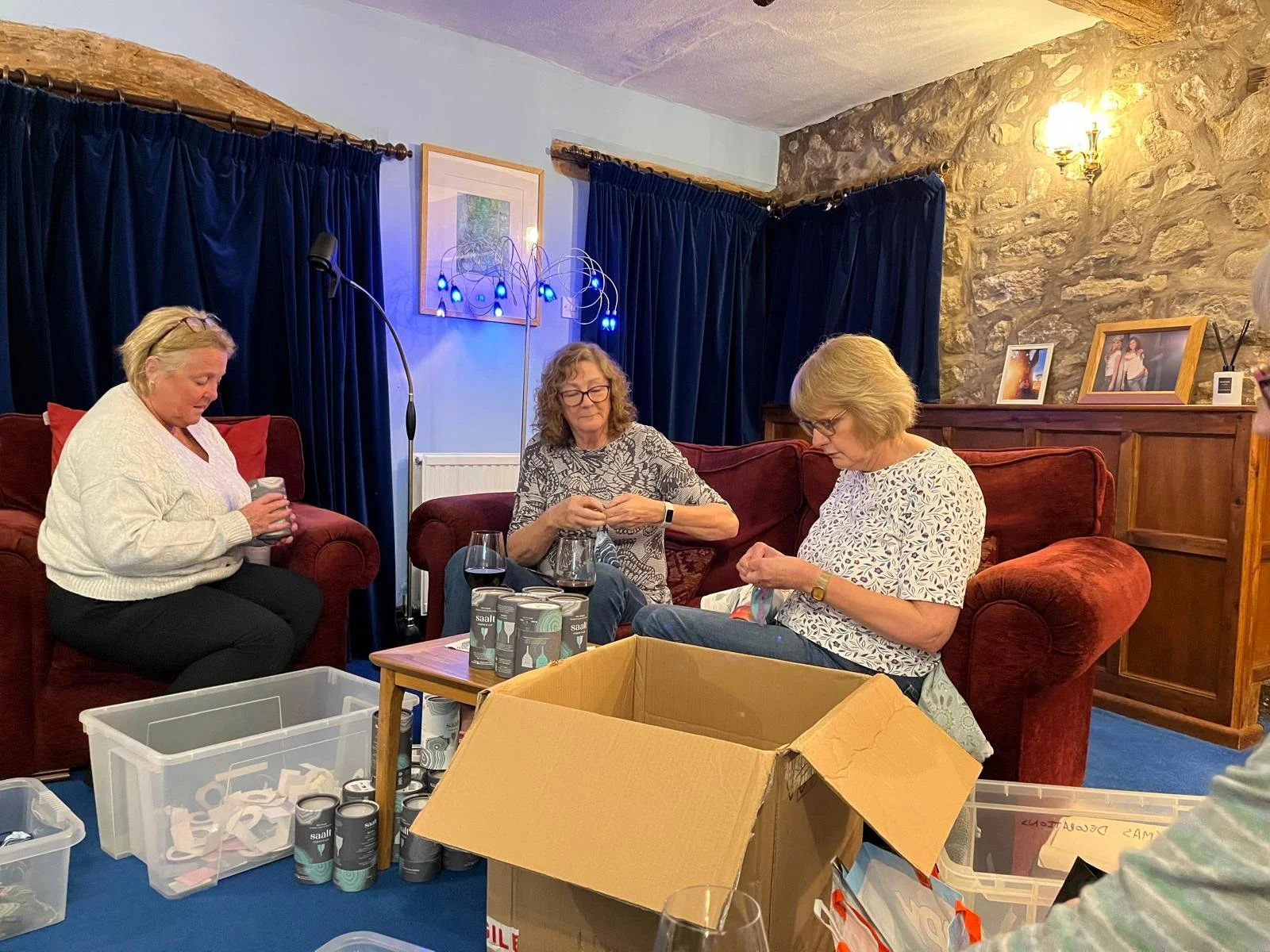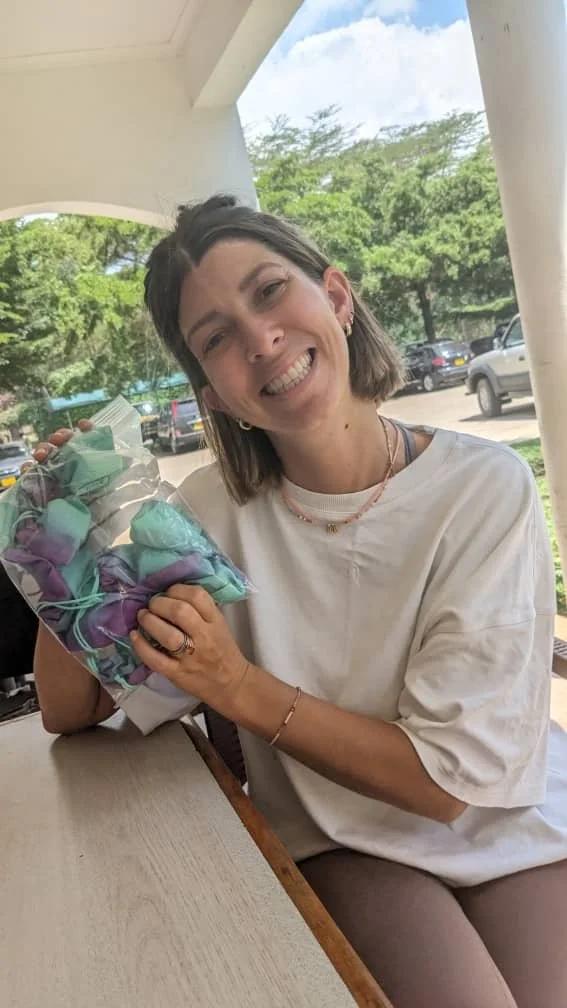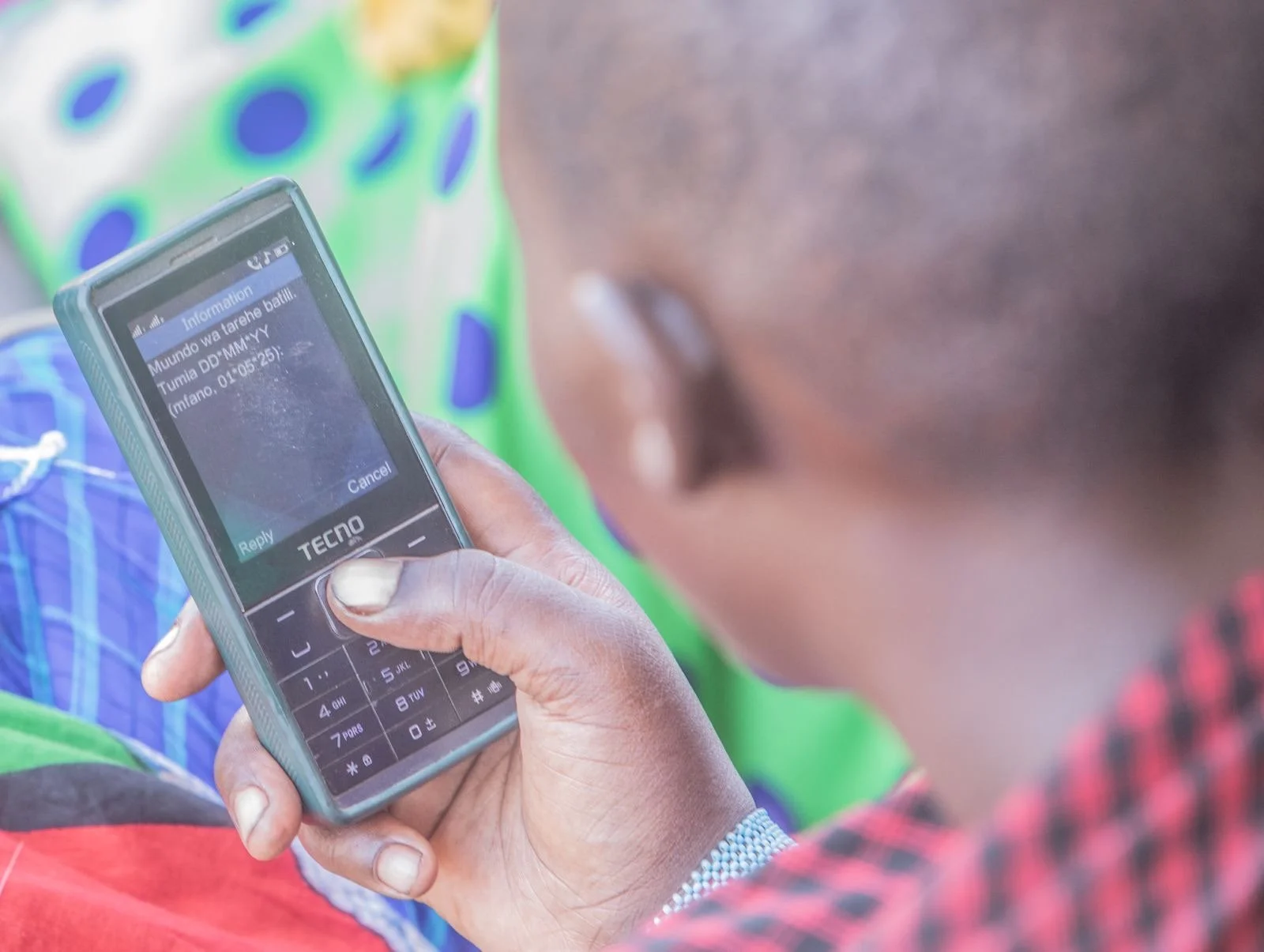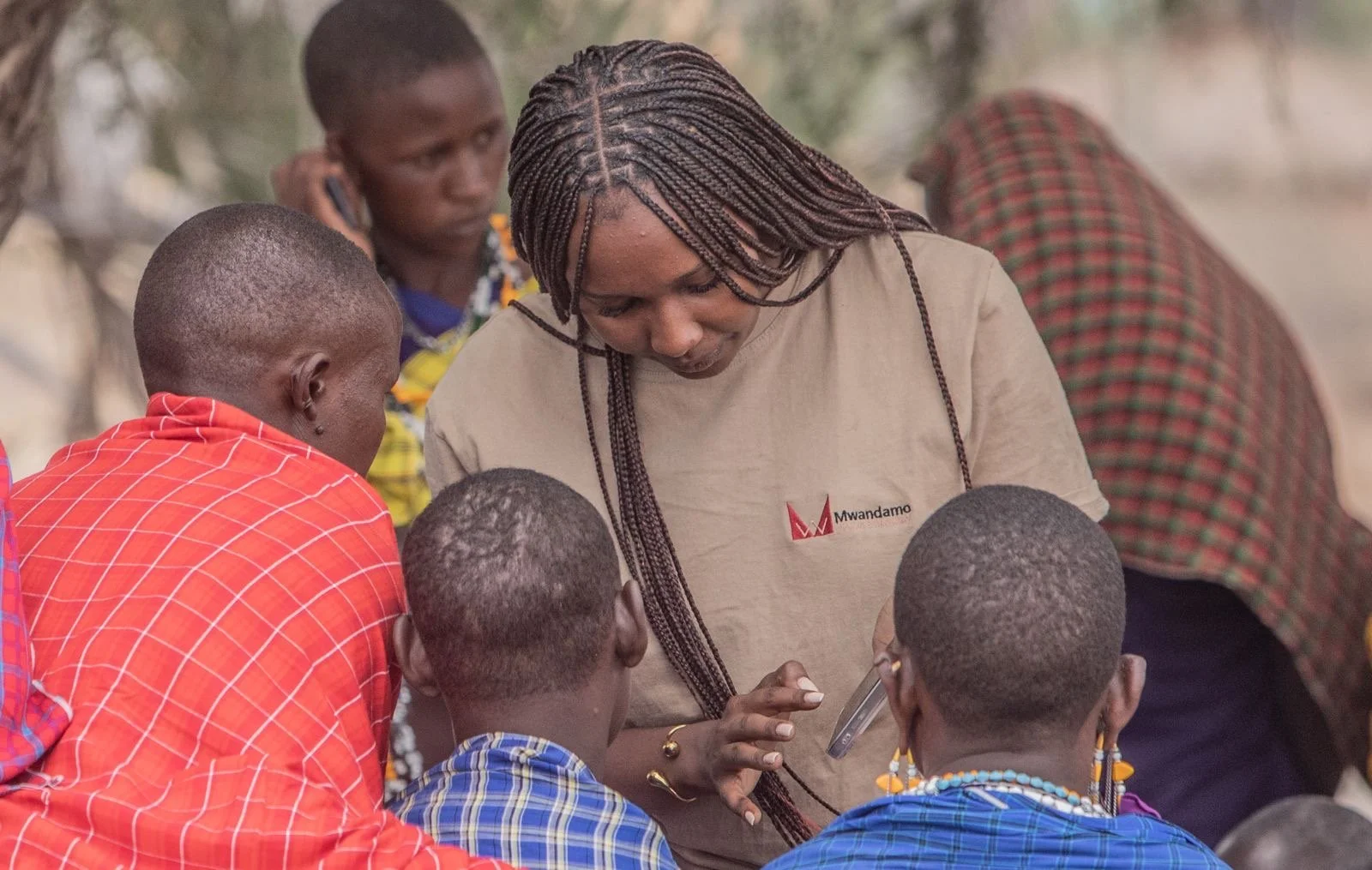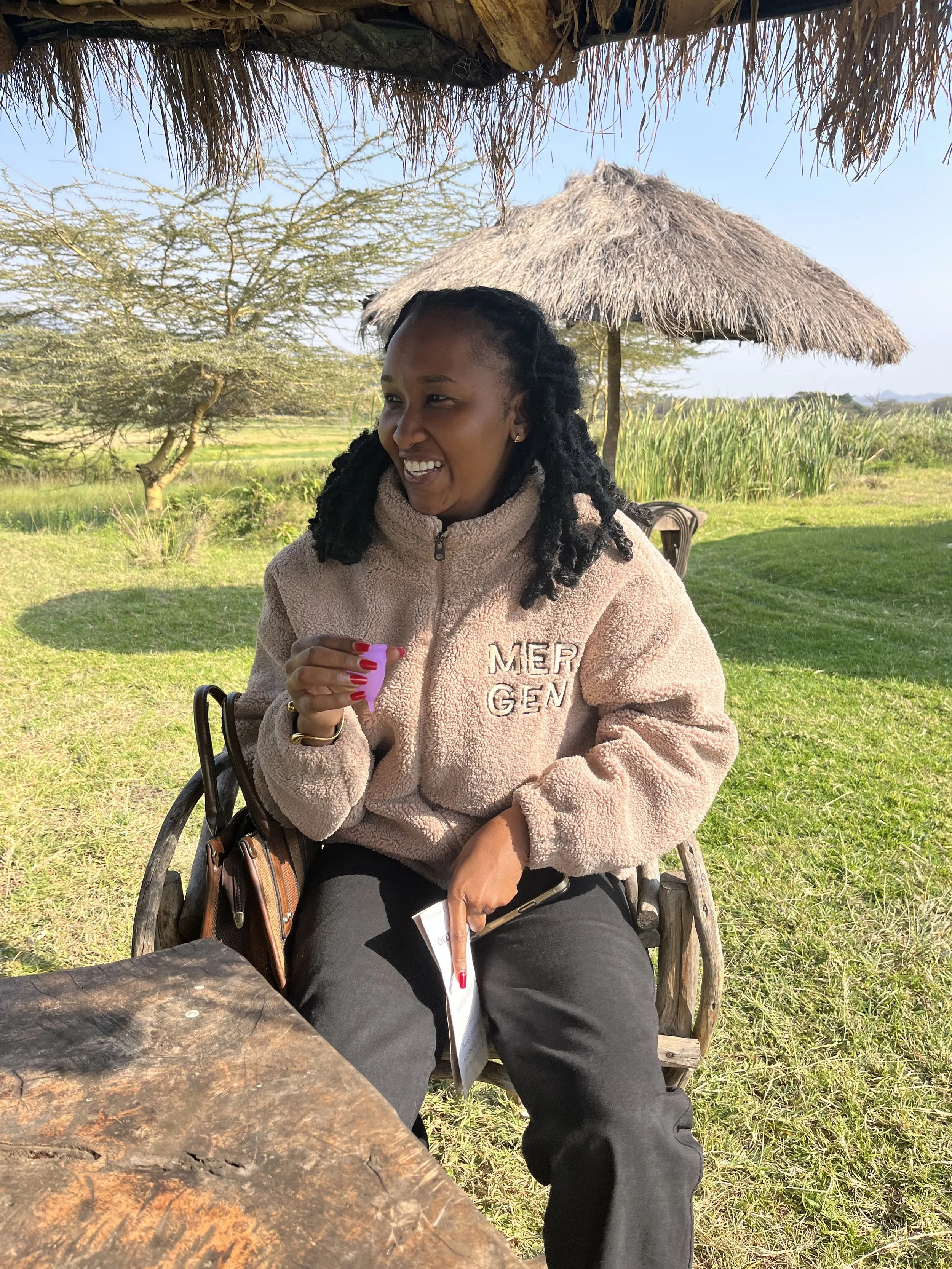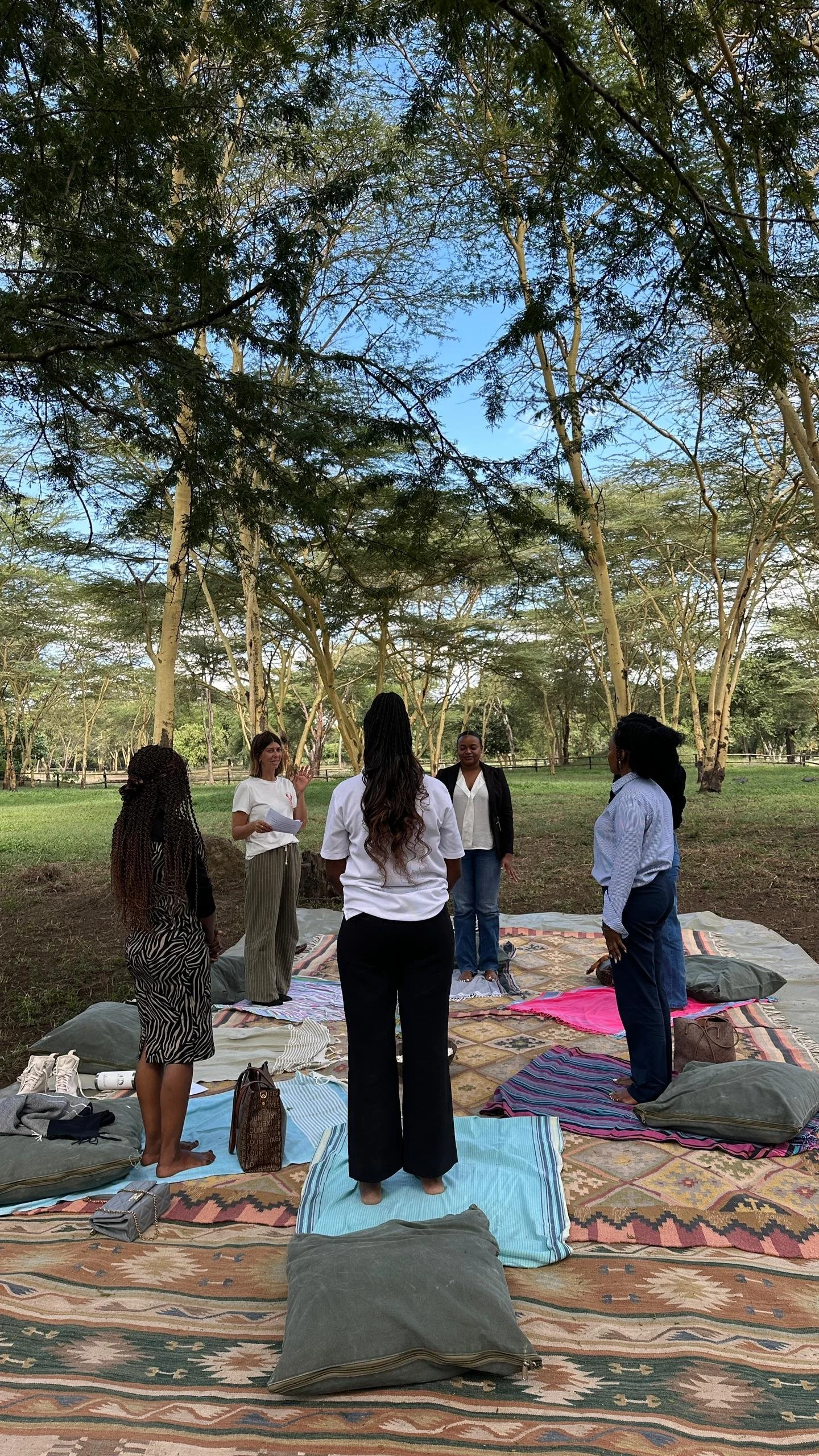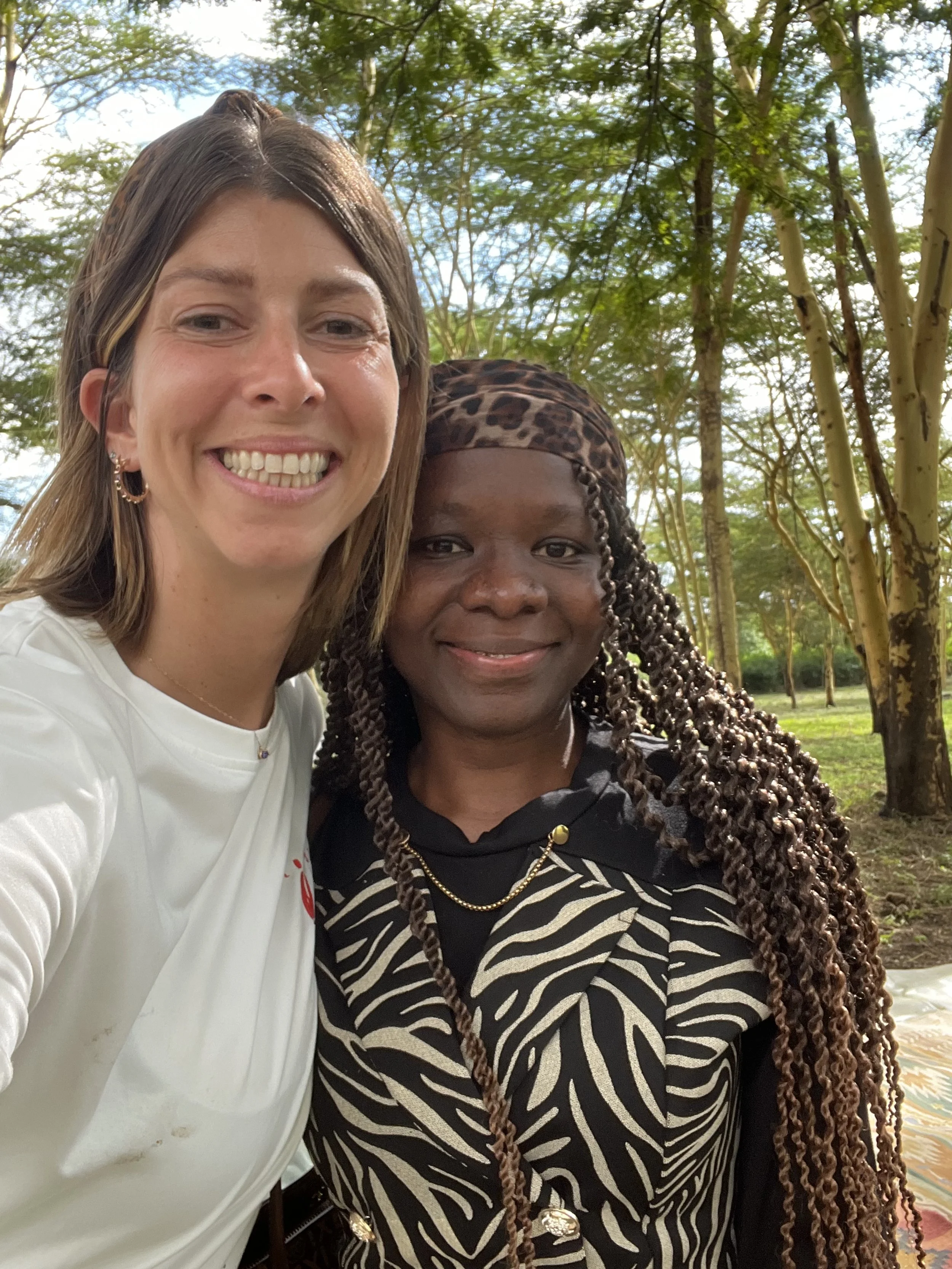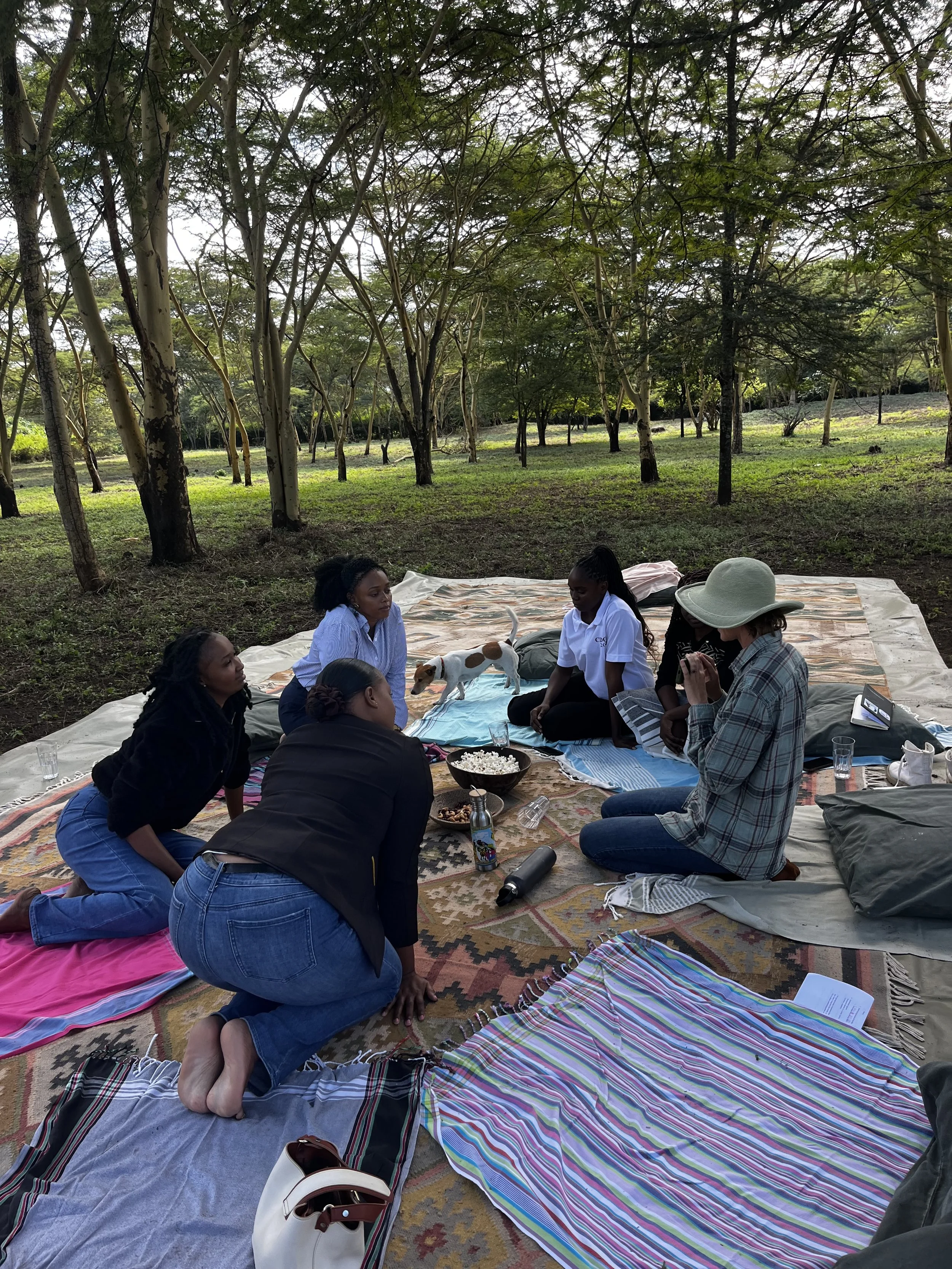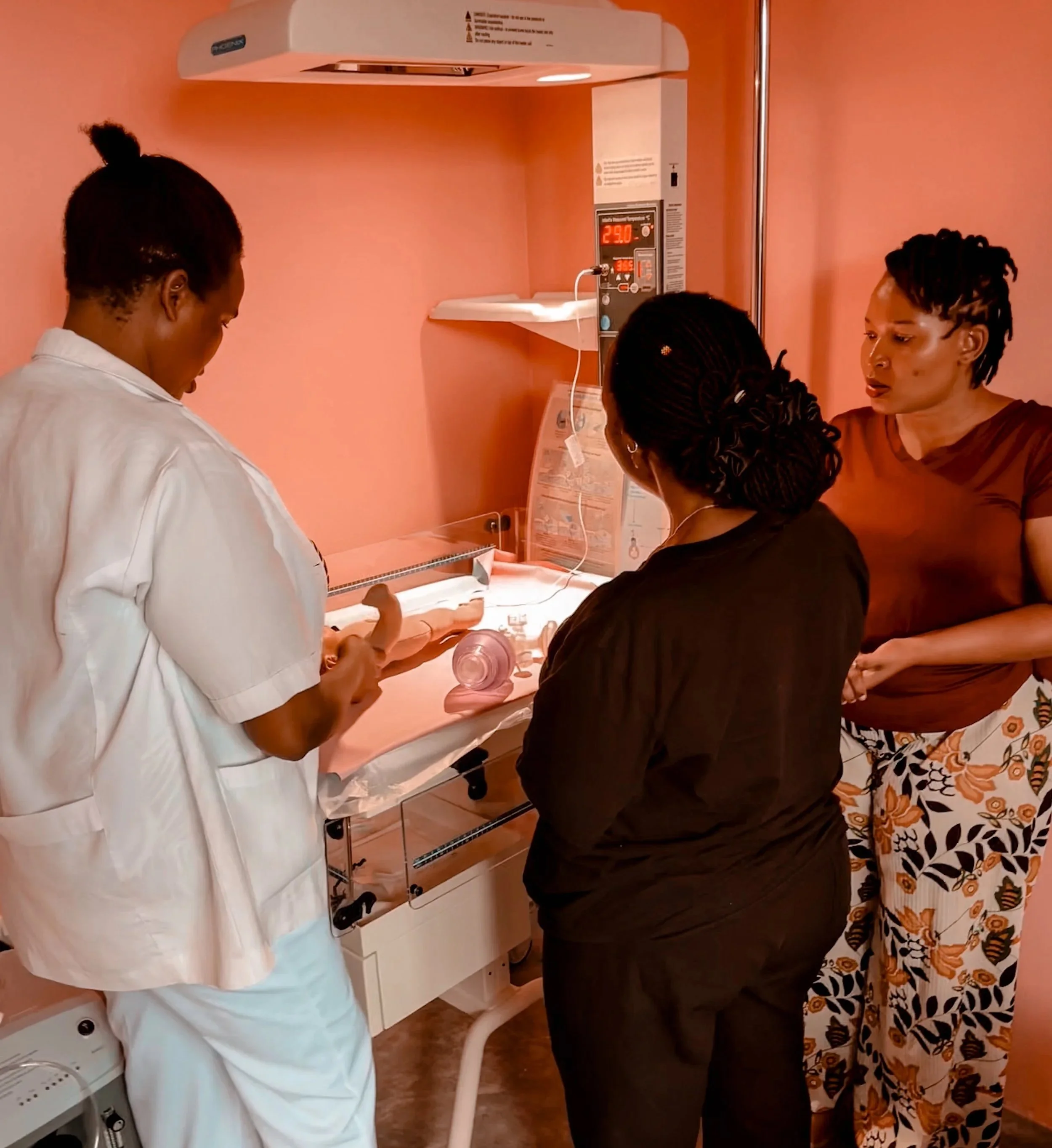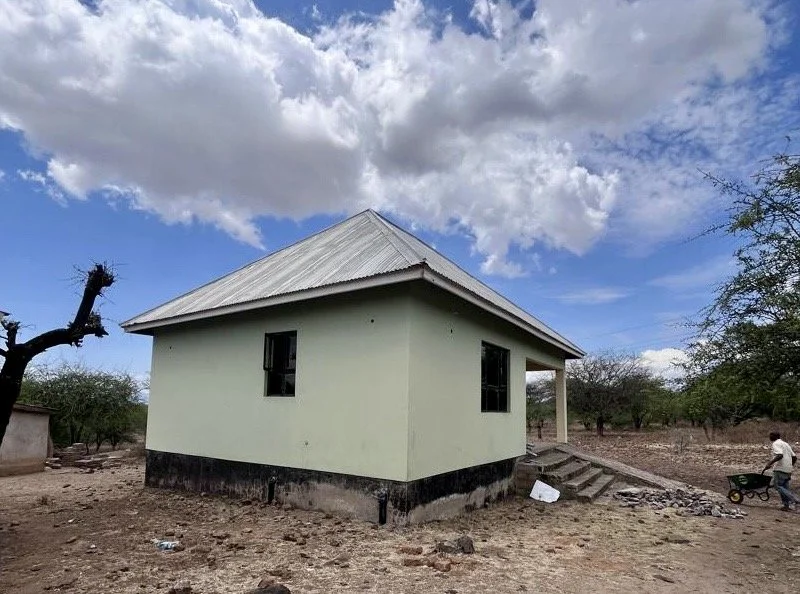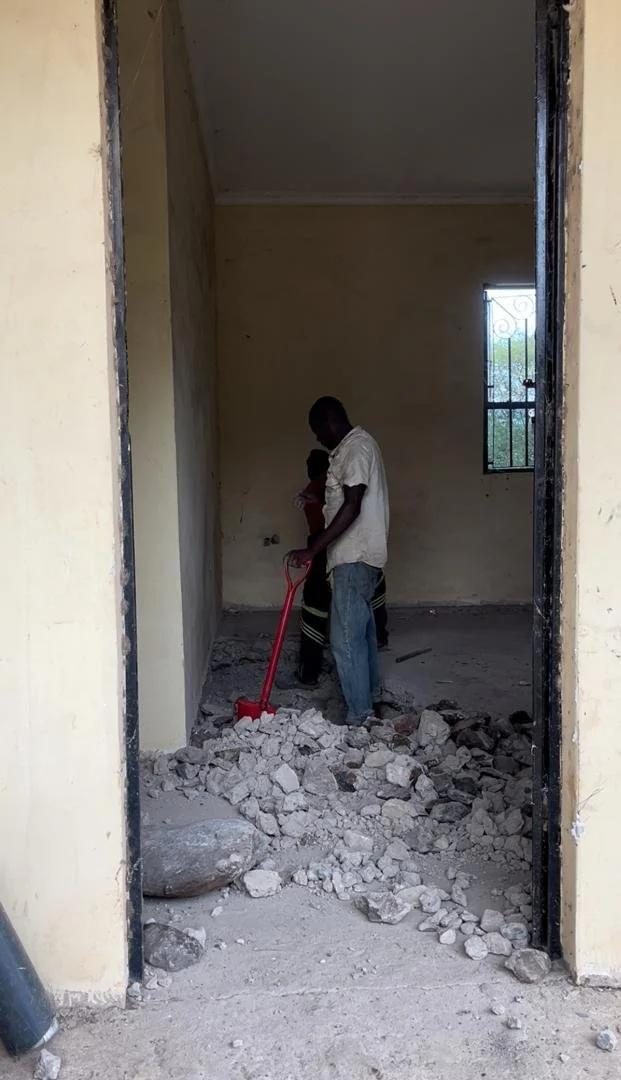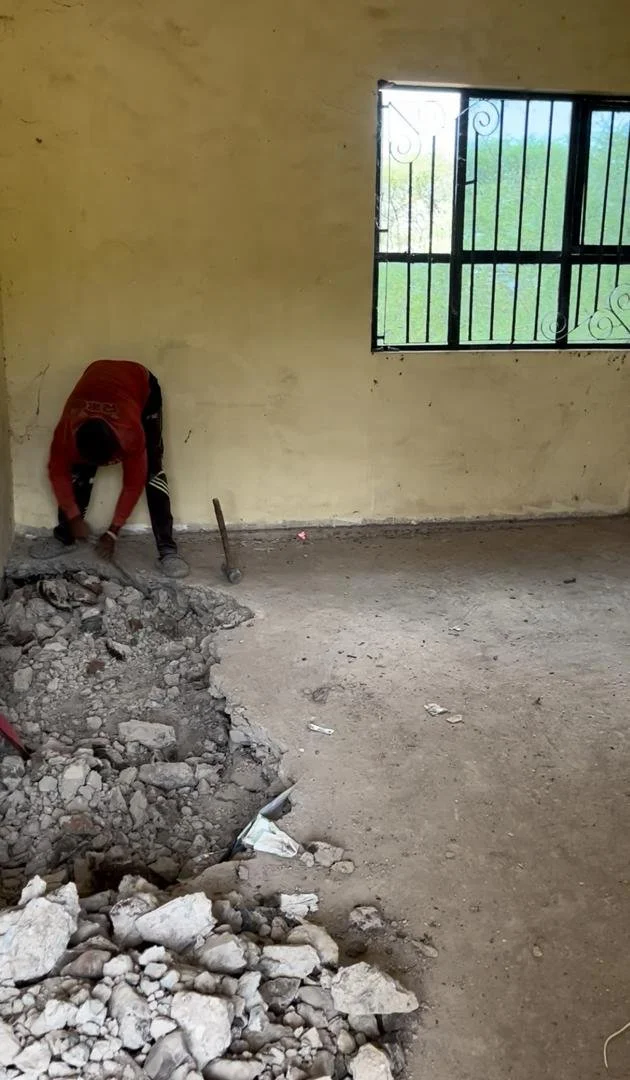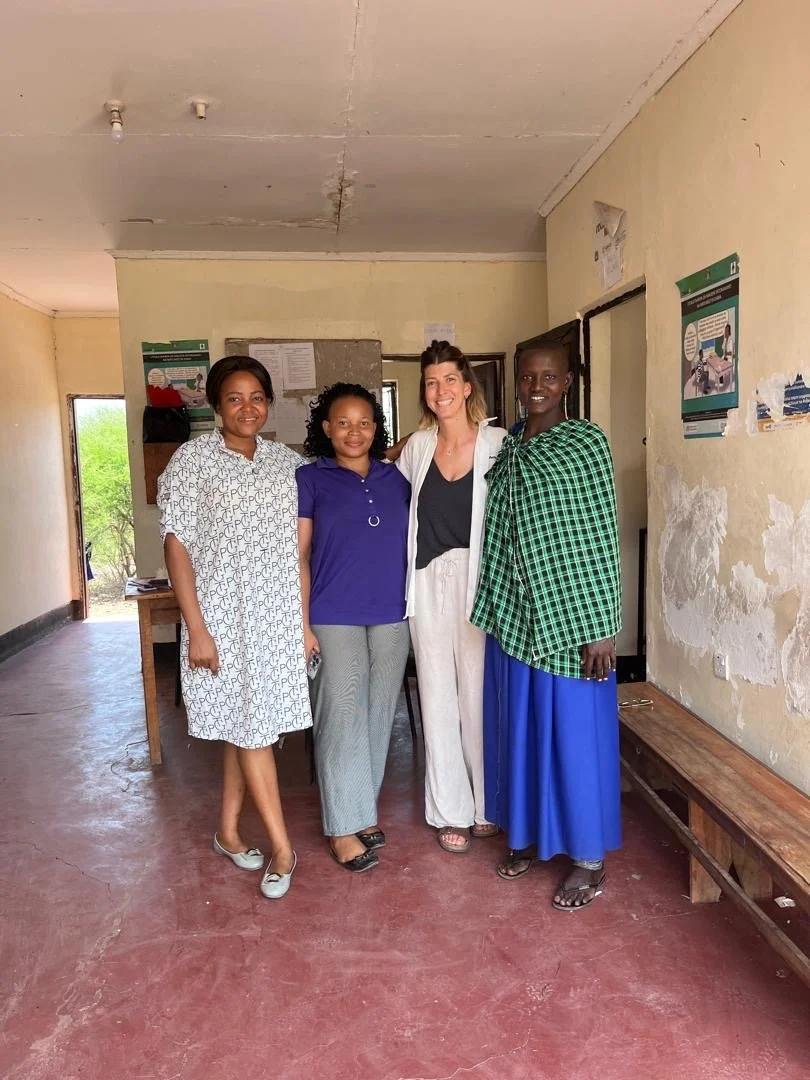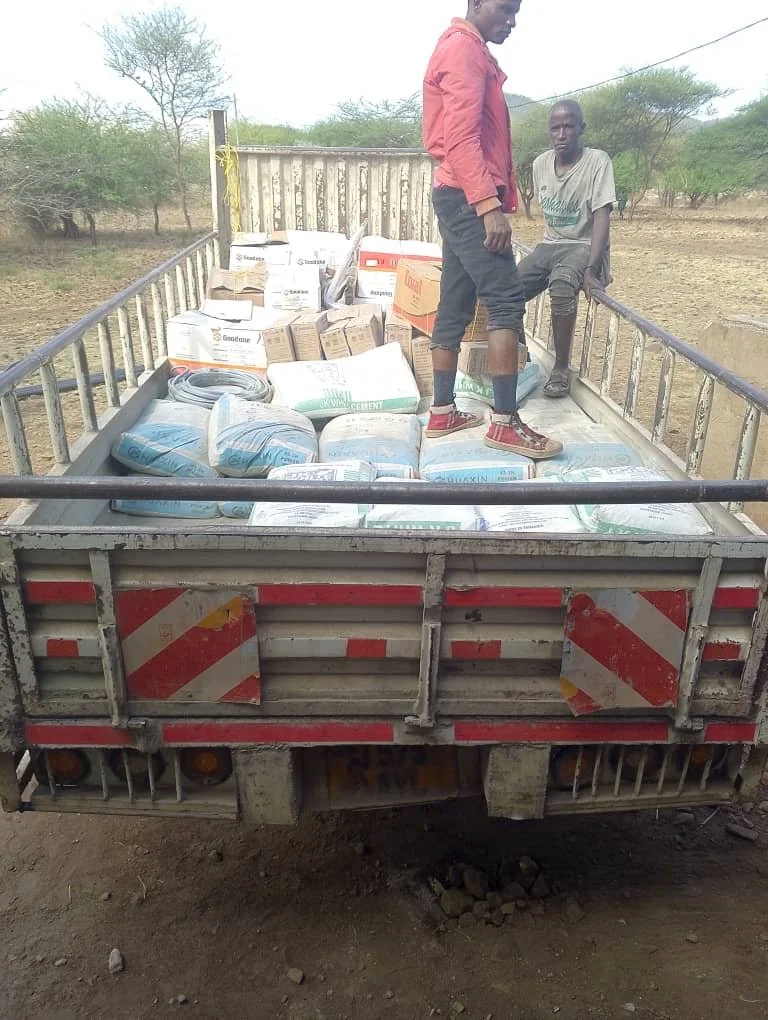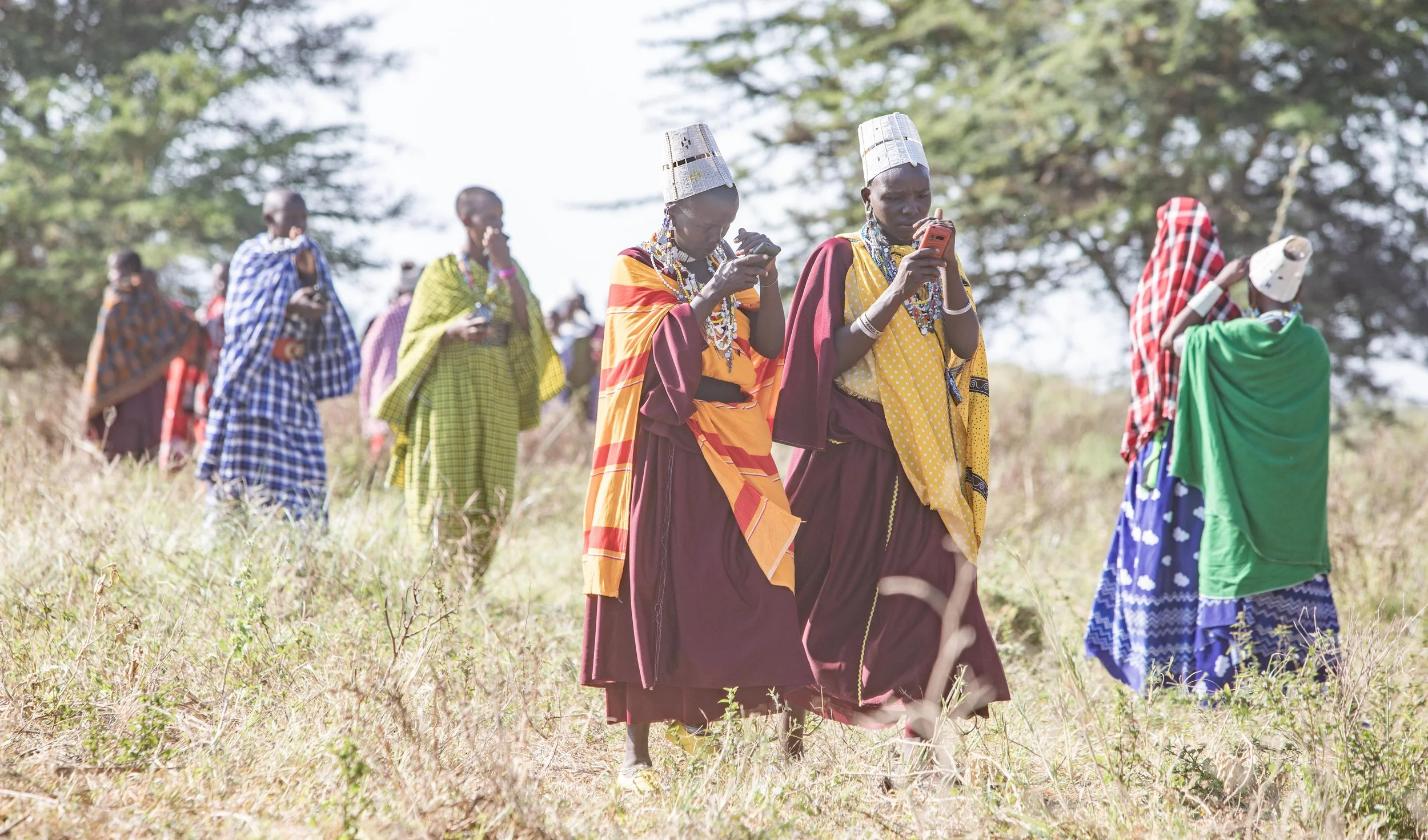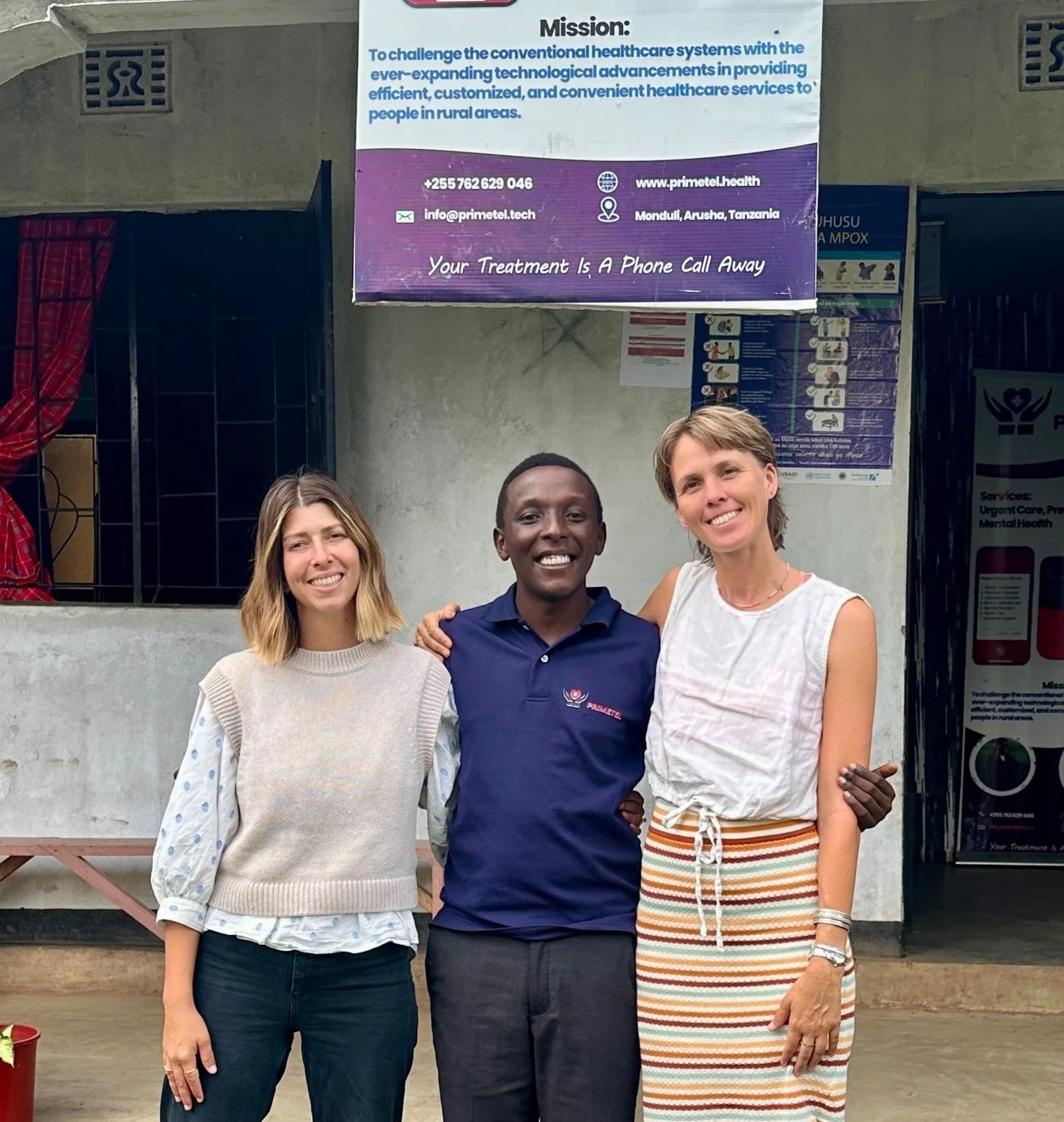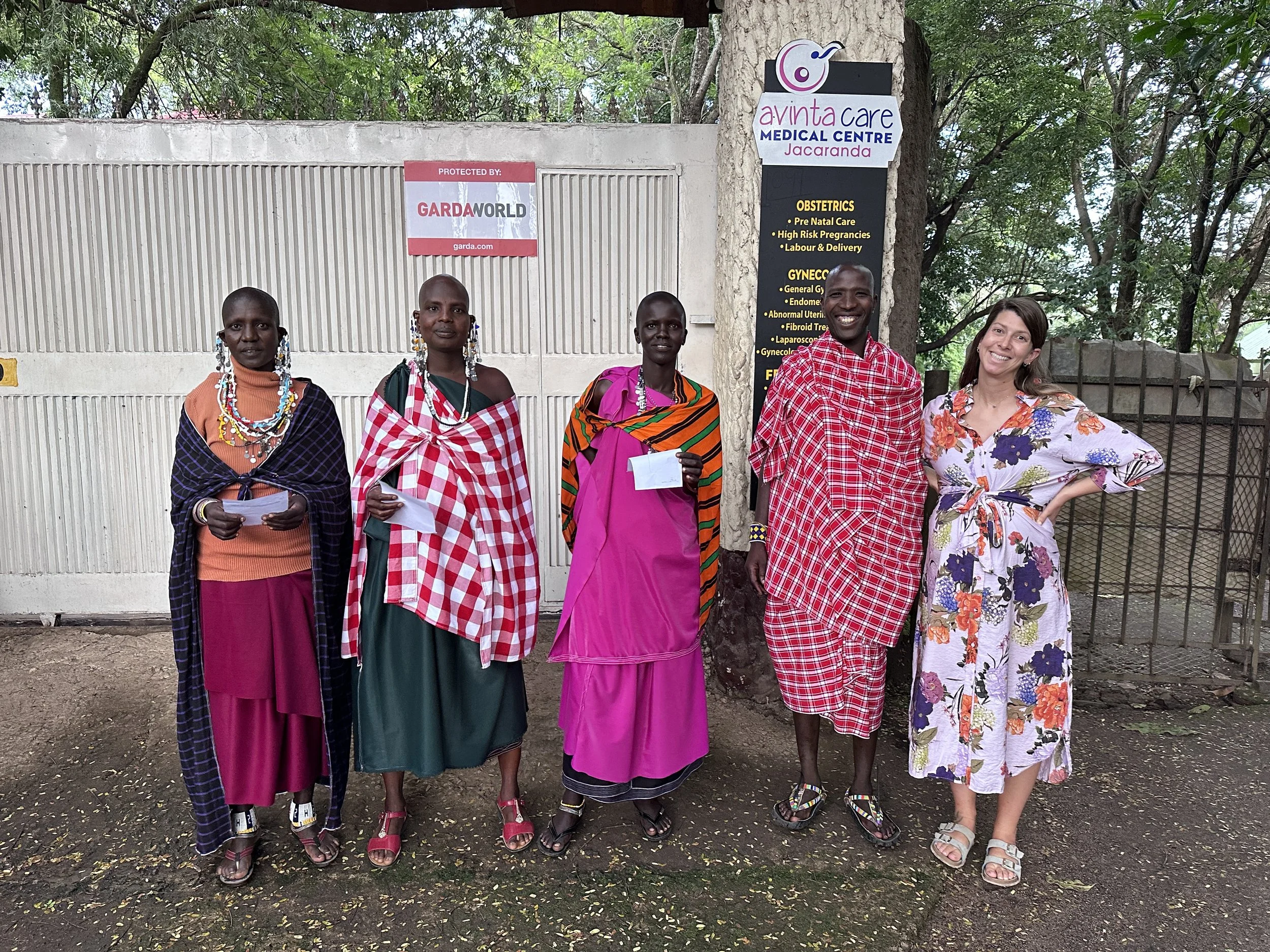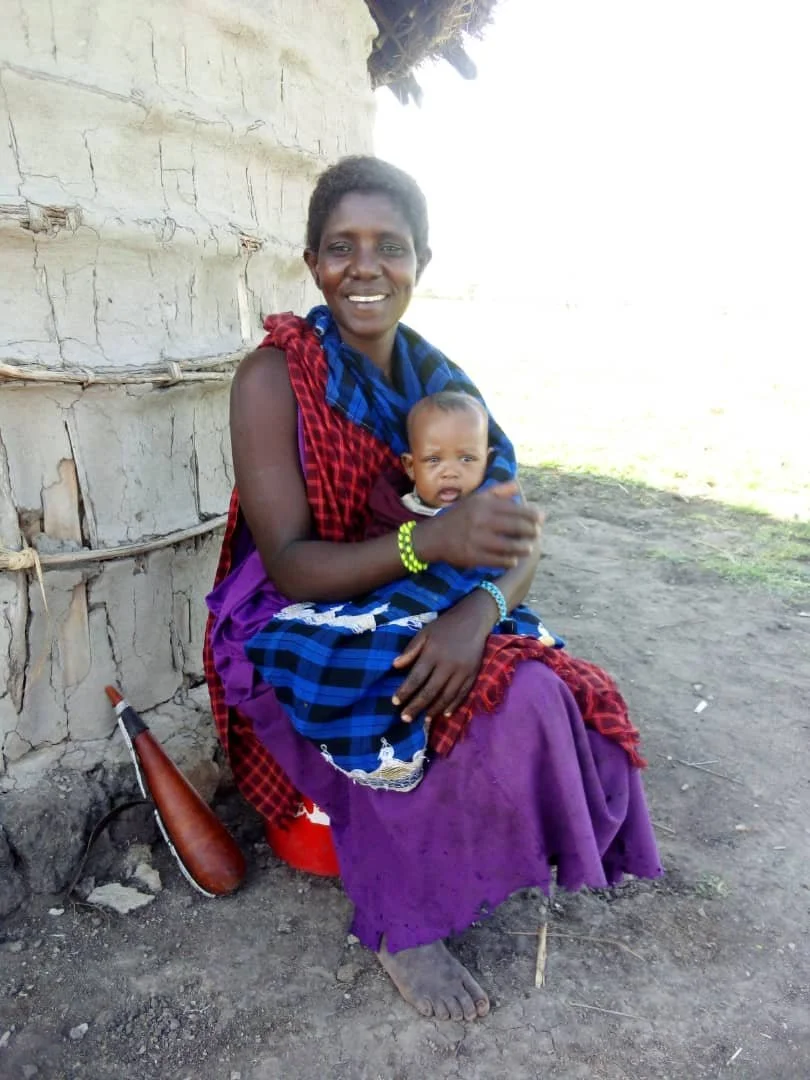The Sisterhood of the Travelling Menstrual Cup
At Mwandamo, we often talk about cycles. Cycles of bodies, of care, of women supporting women. Sometimes, those cycles travel a very long way.
This is the story of a menstrual cup. Or rather, one thousand menstrual cups, and the many hands, homes, journeys, and intentions that carried them to the women and girls of Northern Tanzania.
Earlier last year, we reached out to menstrual cup providers around the world, asking if any might be willing to donate cups that we could distribute through our education and community programmes. We were met with generosity, and we are deeply grateful to Saalt.LLP, an American company who donated 1,000 menstrual cups to support this work.
The cups began their journey in the United States, before crossing the ocean to Southern England, where they first arrived at Hannah’s parents’ home. There, the first boxes were opened, cups unpacked, and as many as possible were carefully fitted into suitcases alongside everyday luggage. Clothes, shoes, and the quiet anticipation of what these cups might mean for the women who would one day receive them.
The remaining cups continued their journey north, posted to Caroline’s parents’ home in Northern England. What happened next feels like the very essence of sisterhood. Caroline’s mum gathered her book group friends, and together they hosted a simple wine and cheese evening. They opened hundreds of menstrual cups, chatting, laughing, and carefully repackaging them into vacuum sealed bags, ready to be carried to Tanzania in yet more suitcases. A living room in England became a temporary waystation in a global chain of care.
Eventually, the cups arrived in Tanzania, where planning shifted from logistics to people. Our Community Health Officer, Neema, asked if she could take some of the cups to a local orphanage. So Caroline packed them into her backpack, climbed onto her motorbike, and travelled along rough roads, weaving past herds of cows, goats, and sheep, to meet Neema at the local shops. Sitting together outside, the two women exchanged the cups, quietly and practically, as women so often do.
From there, Neema carried the cups home. The next day, she boarded a dala dala, using local transport to reach the orphanage, cups in hand.
One cup. One journey. Many women.
When we pause to think about it, it is humbling. A single menstrual cup may have travelled from America, to Southern England, to Northern England, across the seas again to Tanzania, from home to home, by post, by suitcase, by motorbike, by bus, before finally reaching its new owner.
And with that journey comes hope.
Hope that this one small object might transform how a woman or girl experiences her period. Hope that it reduces worry, cost, and shame. Hope that it allows her to attend school, go to work, move freely, and feel more at ease in her body. Used and cared for well, this single cup may support her for years to come.
The story kept reminding us of a childhood favourite, The Sisterhood of the Travelling Pants. Different lives, different places, one shared object carrying connection, care, and possibility between women who may never meet.
This is what menstrual health work often looks like. Not grand gestures, but countless small acts of generosity stitched together across borders. Women supporting women. Communities carrying each other forward.
And sometimes, a menstrual cup travelling halfway around the world, just to do exactly what it was made to do.
Four Months of Mwandamo’s USSD Menstrual Cycle Tracker: What We’re Learning!
Four months ago, we launched something small but powerful: Mwandamo’s USSD menstrual cycle tracking app. With a simple code and no need for internet or a smartphone, women and girls across Tanzania can now track their periods, spot patterns, receive gentle reminders about their cycles and menstrual health educational messages – all completely free.
Why does this matter?
Global research shows that menstrual cycle tracking helps people understand their bodies, recognise changes early, and make informed decisions about sex, fertility, pregnancy, and healthcare. Tracking cycles supports reproductive autonomy by helping individuals anticipate their periods, identify irregularities, and seek timely medical advice when something feels “off.” Menstrual patterns are increasingly recognised as an important health indicator linked to hormonal wellbeing, stress, nutrition, and broader reproductive health.
At the same time, many digital period-tracking apps rely on smartphones, data, and often share or monetise highly sensitive information. For women and girls in low-connectivity or high‑privacy‑risk settings, this makes digital tracking inaccessible or unsafe. Our USSD tool offers a different, more secure pathway: it works on any basic phone, requires no internet, stores no sensitive personal data, and is designed specifically for rural and underserved communities.
While USSD has been used globally for health hotlines and reproductive health information services, very few examples exist of free USSD menstrual tracking tools. This makes Mwandamo’s platform one of the first of its kind – helping bridge a major digital health equity gap.
In just four months, more than 1,000 users have subscribed. Each new user represents another woman gaining clearer insight into their body and greater confidence in their reproductive choices.
The message is simple: when we remove barriers – whether financial, digital, or technological – menstrual health knowledge becomes accessible to everyone. And that is transformative.
CHO Naomi helping women to sign up to the app in Oltukai Village.
A Conversation at the Railway Station
When our friend Neema, a social worker from Maternity Africa, invited us to join her for a teaching session with teenage girls in Arusha, I wasn’t sure what to expect. She directed me to the railway station in the centre of town - an unexpected but fitting place for a health session.
Inside the railway’s ticket office, tucked away behind the waiting area, was a small group of teenage girls, some with their young children, all with notebooks and pens in hand, eager to learn.
Neema began the session on menstrual hygiene, explaining how often pads should be changed, the importance of carrying water in case public bathrooms have none, and how to correctly dispose of single-use pads or wash and dry reusable ones properly. She also guided them on how to track their menstrual cycles, so they could anticipate when their next period would arrive and be ready with supplies.
This was the perfect moment to introduce the Mwandamo USSD app, designed to help girls and women track their cycles and access health education even without internet. Each girl registered successfully with Neema’s help.
Their curiosity didn’t stop there. The girls began asking questions about fertility, how conception timing might influence having a boy or a girl, and what family planning methods are available.
We’ve now been to this same group twice in two weeks, and each time the questions continue to flow—proof of their eagerness to learn and their growing confidence to speak openly about their health. During our second visit, we distributed 15 packs of reusable menstrual pads and introduced Saalt’s menstrual cups. A few of the girls will be testing the cups and sharing their feedback on comfort and ease of use in the coming weeks.
These young women, gathered by their social worker Madame Suma, are training to become seamstresses or to work in salons, building futures for themselves while navigating the challenges of adolescence and motherhood.
It doesn’t matter about the space or the setting. What matters is girls coming together to learn, share, and educate themselves about their own health. Whether it is a classroom, a church hall, or a small railway ticket office, what’s important is that these conversations are happening. And on those days, the railway station was the perfect place.
Sitting in that small waiting room, talking about periods and reproductive health, I was reminded how simple conversations can spark change. These girls leave that room and go back into the busy streets of Arusha more informed, more confident, and hopefully more open to speaking about menstruation without shame.
It’s in moments like this that Mwandamo’s mission feels most alive: to listen, to learn, and to help, woman to woman, girl to girl.
Every Woman Counts: The Core Values That Shape Us
In a world full of statistics, targets, and tallies of “impact,” it’s easy to lose sight of the people behind the numbers. At Mwandamo, we are determined never to do that. Every woman in our programs represents not a data point, but a story - a voice, a journey, and a human being who deserves to feel seen, heard, safe, and cared for.
Our mission is to improve women’s health outcomes across Northern Tanzania by providing holistic education and compassionate care that empower women to understand their bodies and advocate for their health with confidence.
We founded Mwandamo because we saw a gap, not just in access to healthcare, but in how women were being treated within it. Too often, their questions went unanswered. Their concerns were dismissed. Their rights were unknown. We wanted to create something different, something human, something kind.
1. Compassion Before Metrics
We measure success not by the number of women we reach, but by how deeply we reach them. Our impact is found in quiet, powerful moments when a woman realizes her voice matters in the clinic, when a mother asks a question she’s always been afraid to ask, when a young girl leaves one of our sessions standing a little taller.
2. Education as Empowerment
We believe knowledge is a form of care. By teaching women about their bodies, their rights, and the quality of care they deserve, we help them become their own best advocates. Health education is not just information, it’s liberation.
3. Dignity in Every Interaction
In regions where women’s voices are too often dismissed, we ensure they are heard with respect and compassion. Whether speaking to healthcare providers, family members, or community leaders, we support women in standing firm in their worth.
4. Partnership, Not Paternalism
We don’t arrive with all the answers, we listen first. Mwandamo grows through partnership: with the women we serve, with local healthcare workers, and with the communities that nurture them. Together, we create spaces where women are participants in their own progress, not subjects of someone else’s charity.
5. Whole-Person Care
True health is more than the absence of illness. It’s confidence, connection, and care that encompass the physical, emotional, and social. Our approach recognizes that when women feel safe, informed, and respected, their whole families and communities thrive.
Why This Matters
Too many initiatives are designed for women, not with them. At Mwandamo, we’re working to change that, to ensure that every woman who appears in our reports and photographs is known, remembered, and respected as an individual whose wellbeing has truly improved.
Because to us, impact isn’t about how many, it’s about how deeply.
About the Founders
Hannah was born and raised in Tanzania and is a Yoga Teacher and Pregnancy & Pelvic Floor Specialist, empowering women through movement and wellbeing.
Caroline is a UK-trained midwife who has worked in Tanzania since 2014, training and mentoring midwives to strengthen local healthcare systems.
Together, we built Mwandamo on a simple belief:
“When a woman feels heard, she begins to heal. When she feels empowered, she begins to change the world around her.”
A Morning at Africa Amini Momela Health Centre.
Today, with our two new team members, we set off early to drive to the Africa Amini Momela Health Centre. We had the opportunity to meet with the staff after their morning meeting to talk briefly about Mwandamo and educate them on our USSD app for menstrual cycle tracking.
Following the feedback we received from the app's pilot in Esilalei, we made many changes and resolved technical issues. The team here and in Uganda have worked tirelessly to make the app as user-friendly, smooth, and easy as possible for women to register and input their details. Our visit was a chance to continue our pilot programme with the staff at the health centre in the hope that they can assist their patients in registering and using the service.
Of course, nothing ever goes as perfectly as you hope, and we ran into some further technical problems. We encountered issues with individual network providers, data input errors, and some backlog snags. However, this is precisely the reason we run pilot programmes - these honest user experiences are invaluable stepping stones toward making the app even better.
The staff members raised two main points of feedback. First, they asked that the app's timeout window be extended, which would allow them to walk patients through its usage at a slower pace. Their second question was how the app would work for women with irregular cycles. We explained that while the app initially uses a standard 28-day cycle for its predictions, it becomes more accurate over time as women log their own personal data.
After our session, we were given a tour of the Polyclinic. We found the natural remedies area particularly interesting and got to meet the team who made the herbal tinctures from scratch. Meeting the people behind this was a humbling reminder of just how much care and creativity goes into holistic healthcare.
We were welcomed warmly by the staff and enjoyed chai, ndizi, and kaimati with them before heading back. We left inspired by the beautiful location and amazing services on offer, giving us ideas for our own women's health clinic one day…
A New Chapter of Growth: Welcoming Mwandamo Community Health Workers!
A New Chapter of Growth: Welcoming Mwandamo Community Health Workers!
With Mwandamo’s continued growth, it became clear that our small team of two needed to expand to keep pace with our ambitious goals for 2026. To achieve these key objectives - including holding women’s circles, distributing reusable sanitary pads, providing health education to over 500 women, launching and monitoring our USSD app, and equipping two rural health dispensaries, we put out a call for two Community Health Workers. We were specifically seeking women who could not only support our mission but also enrich the team with their unique ideas, energy, and experiences.
Rather than going with formal interviews, we decided to do things the Mwandamo way. We invited all the applicants to sit in a circle under the trees at Hannah’s beautiful home. We talked, shared stories, connected, and got a chance to see how everyone interacted together. It felt more like a gathering of friends than an interview - and we loved it. We left feeling uplifted and inspired by all the work these women are already doing in their own communities.
After taking some time to reflect, we selected two wonderful women to join us as Community Health Workers and offered an internship to another. We didn’t want to lose the spark of connection with the rest of the group, so we’re already looking at ways to collaborate with them and make promising partnerships in the future.
We’re really excited about this next chapter at Mwandamo. Bringing more women into the team not only helps us to expand our reach, but also shows that the work we’re doing together is making an impact. Mwandamo is growing, rooted in sisterhood, community, and shared purpose!
With Mwandamo’s continued growth, it became clear that our small team of two needed to expand to keep pace with our ambitious goals for 2026. To achieve these key objectives - including holding women’s circles, distributing reusable sanitary pads, providing health education to over 500 women, launching and monitoring our USSD app, and equipping two rural health dispensaries, we put out a call for two Community Health Workers. We were specifically seeking women who could not only support our mission but also enrich the team with their unique ideas, energy, and experiences.
Rather than going with formal interviews, we decided to do things the Mwandamo way. We invited all the applicants to sit in a circle under the trees at Hannah’s beautiful home. We talked, shared stories, connected, and got a chance to see how everyone interacted together. It felt more like a gathering of friends than an interview - and we loved it. We left feeling uplifted and inspired by all the work these women are already doing in their own communities.
After taking some time to reflect, we selected two wonderful women to join us as Community Health Workers and offered an internship to another. We didn’t want to lose the spark of connection with the rest of the group, so we’re already looking at ways to collaborate with them and make promising partnerships in the future.
We’re really excited about this next chapter at Mwandamo. Bringing more women into the team not only helps us to expand our reach, but also shows that the work we’re doing together is making an impact. Mwandamo is growing, rooted in sisterhood, community, and shared purpose!
🌙 One (official) Year of Mwandamo 🌍
One year ago this month, Caroline and Hannah took a leap and officially registered Mwandamo as a UK CIC — and what a journey it’s been. We thought we would take a moment, pause to reflect and celebrate with you all.
From heartfelt dreams, tough conversations to powerful women’s circles and functioning new maternity units — we’ve had the honour of witnessing vulnerability, strength, hope, compassion and deep connection. Every woman we’ve met has shaped this journey. Every story shared has lit the way.
We are endlessly grateful to be here — grounded in community, uplifted by sisterhood, and part of a global movement where women continue to empower one another.
Here’s to the women who walk with us. Here’s to what’s next. 💛
Checking In at Esilalei Maternity: Skills, Support & Celebrations
A few weeks after the grand opening of the Esilalei Maternity Unit, we made our way back to catch up with the incredible team and see how everything was running. Ten mothers had already delivered in the brand-new labour ward! As we sat reviewing the delivery register, something stood out - only four out of the ten women knew the date of their last menstrual period or their expected due date. Once again, this highlighted just how essential our upcoming USSD platform is: helping women track their cycles and calculate their gestation with simple, accessible mobile tools. Knowledge is power, especially when it comes to maternal health.
We spent the day alongside the midwife and clinical officer, refreshing core obstetric emergency skills. Together we worked through both theory and hands-on drills, discussing postpartum haemorrhage, antepartum hemorrhage, pre-eclampsia, shoulder dystocia, breech delivery and neonatal resuscitation. These scenarios aren’t ones they will face daily but being prepared to manage them confidently can mean the difference between life and death.
To support this, Mwandamo designed a set of Obstetric Emergency Guidelines - clear, practical and easy to grab in a stressful moment or read during quieter times. We also walked through every new piece of donated equipment step by step. There’s no point supplying tools if no one knows how to use them, so we made sure each team member felt confident turning them on, setting them up and troubleshooting.
Of course, it wouldn’t be a proper Esilalei day without chai and warm chapatis! Between revision sessions we shared stories, discussed challenges, and even played an obstetric emergency game, a brilliant teaching tool passed down from a legendary former midwife trainer. It felt right to carry forward her energy, passion and legacy.
Days like this remind us why we started Mwandamo: skilled, motivated healthcare workers save lives. Supporting them with the right knowledge, tools and ongoing mentorship is at the heart of our mission. We left Esilalei energised, full of admiration for the team and excitement for what’s ahead as we roll out the USSD platform and continue strengthening rural maternity care.
Practising Neonatal Resuscitation
A few weeks after the grand opening of the Esilalei Maternity Unit, we made our way back to catch up with the incredible team and see how everything was running. Ten mothers had already delivered in the brand-new labour ward! As we sat reviewing the delivery register, something stood out - only four out of the ten women knew the date of their last menstrual period or their expected due date. Once again, this highlighted just how essential our upcoming USSD platform is: helping women track their cycles and calculate their gestation with simple, accessible mobile tools. Knowledge is power, especially when it comes to maternal health.
We spent the day alongside the midwife and clinical officer, refreshing core obstetric emergency skills. Together we worked through both theory and hands-on drills, discussing postpartum haemorrhage, antepartum hemorrhage, pre-eclampsia, shoulder dystocia, breech delivery and neonatal resuscitation. These scenarios aren’t ones they will face daily but being prepared to manage them confidently can mean the difference between life and death.
To support this, Mwandamo designed a set of Obstetric Emergency Guidelines - clear, practical and easy to grab in a stressful moment or read during quieter times. We also walked through every new piece of donated equipment step by step. There’s no point supplying tools if no one knows how to use them, so we made sure each team member felt confident turning them on, setting them up and troubleshooting.
Of course, it wouldn’t be a proper Esilalei day without chai and warm chapatis! Between revision sessions we shared stories, discussed challenges, and even played an obstetric emergency game, a brilliant teaching tool passed down from a legendary former midwife trainer. It felt right to carry forward her energy, passion and legacy.
Days like this remind us why we started Mwandamo: skilled, motivated healthcare workers save lives. Supporting them with the right knowledge, tools and ongoing mentorship is at the heart of our mission. We left Esilalei energised, full of admiration for the team and excitement for what’s ahead as we roll out the USSD platform and continue strengthening rural maternity care.
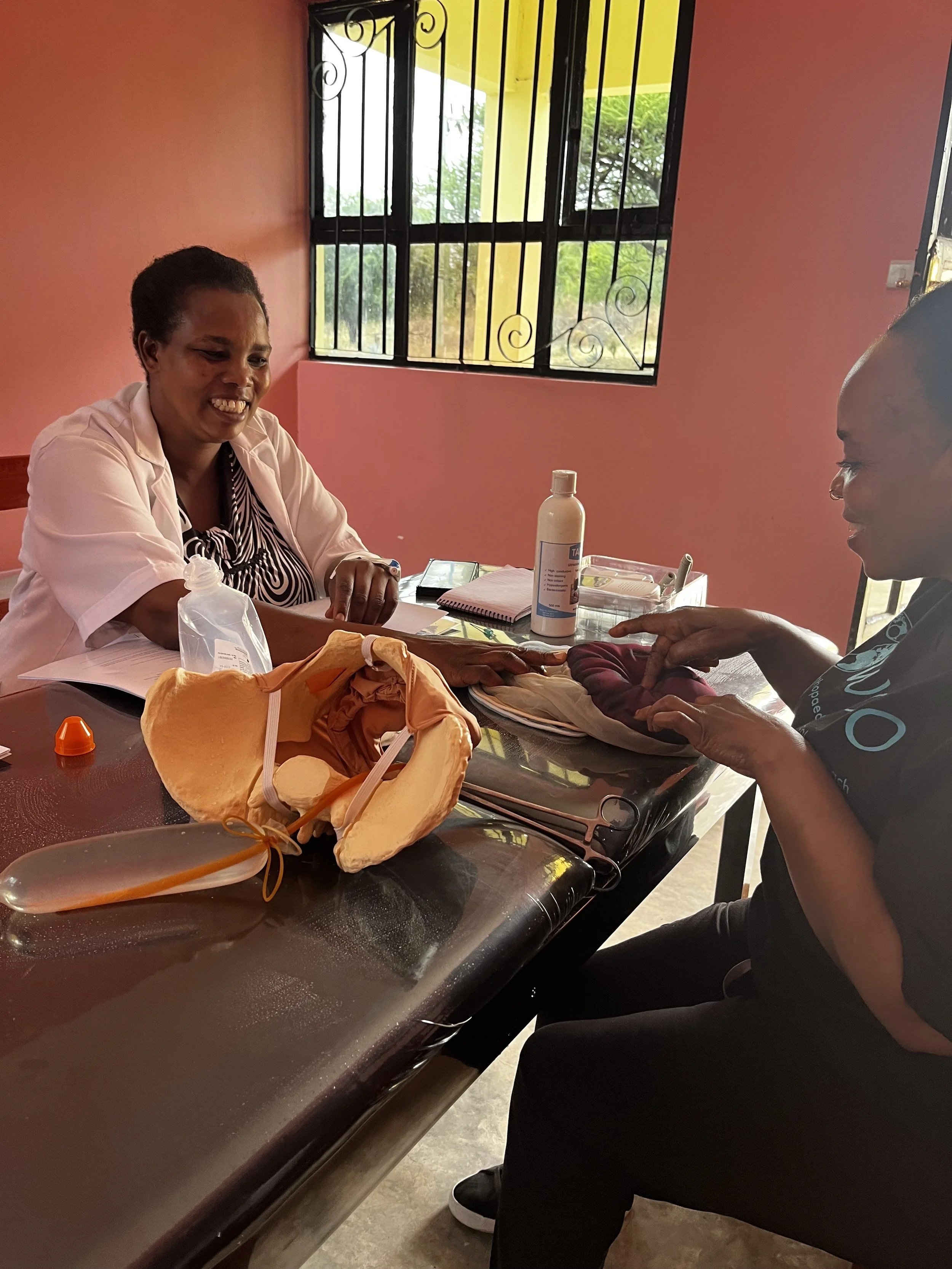
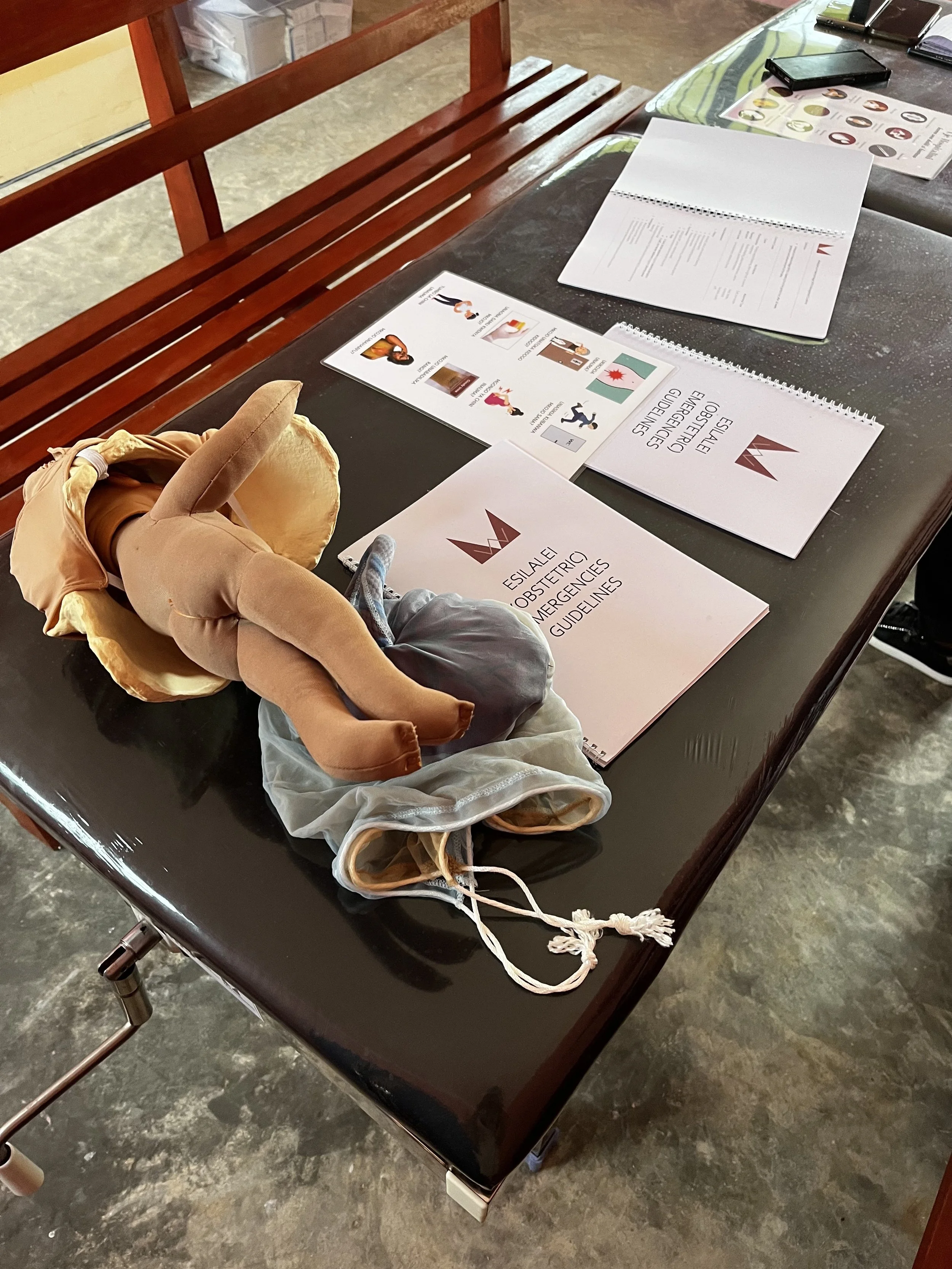

A New Chapter for Maternal Health in Esilalei
This month marked a monumental milestone for the community of Esilalei, nestled on the border of Manyara Ranch, with the official opening of a long-awaited maternity unit. What once stood as an empty shell of a building—abandoned after funding disappeared during the COVID-19 pandemic—has now been transformed into a fully functioning, welcoming, and dignified space for mothers to give birth safely.
The original structure, left without electricity or plumbing, sat unfinished for years. But thanks to the dedication of a committed team and generous supporters, we were able to complete the building and breathe life back into its walls. This included vital infrastructure work such as installing electrics, plumbing, painting the facility, and adding both stairs and a ramp for full accessibility.
Inside, the unit has been thoughtfully equipped to support mothers through every step of their journey. A calm and spacious waiting room with benches welcomes women and their families. Nearby, there is a well-prepared area where vital signs such as weight and blood pressure can be checked before labour begins.
Adding a warm and meaningful touch to the waiting room is a beautiful mural of a giant baobab tree, hand-painted on the wall. This tree will grow with the community—each time a baby is born in the unit, their handprints will be added to the branches. It’s a living symbol of life, growth, and connection. At the opening, we proudly added our own handprints to get it started.
The heart of the unit features a labour room with a birthing bed, an oxygen concentrator, a resuscitaire, and a steriliser—critical tools that ensure both mothers and newborns receive timely, life-saving care. After delivery, mothers can recover in a comfortable ward with two beds, allowing for rest and privacy. Hygiene and sanitation are a top priority, and the facility includes two bathrooms complete with toilets and showers. Waste disposal buckets have also been provided to ensure cleanliness and safety.
And the most joyful news of all—within just 48 hours of opening, the first baby was born at the new clinic. A strong and healthy 4.2kg boy named Jerry made his arrival, and both he and his mama are doing wonderfully. His handprint will be the very first leaf on our baobab of new beginnings.
The opening ceremony was a heartfelt and inspiring event. The Esilalei village chairman welcomed guests, and the district director joined with government representatives from neighbouring villages to celebrate. The strong turnout from the local community reflected just how meaningful this development is to everyone it will serve.
We were honoured to have several key partners in attendance. Board members from Mwandamo, including Mahela, a practicing midwife, and Monica from the Ewang’an Foundation, brought their expertise and enthusiasm. Marias from the Royal African Foundation also joined us, showing cross-organizational support for this important project.
This maternity unit is more than a building—it’s a promise to the women of Esilalei that they deserve safe, supported, and dignified births. It’s a symbol of resilience, of what can be accomplished when communities and partners come together with a shared vision. We believe that every mother should have access to high-quality care, no matter where she lives, and this facility is a powerful step in that direction.
As we look ahead, we remain committed to supporting this maternity unit with ongoing training, maintenance, and resources. But for now, we pause to celebrate this hard-earned achievement. To everyone who played a role—thank you. Your efforts have given life not only to a building, but to the many futures it will help bring into the world.
Empowering Conversations with Young Women at Orkeeswa Secondary School
A few weeks ago, Caroline and Hannah had the privilege of sitting in a circle with ten remarkable girls aged 14 to 20 at Orkeeswa Secondary School in Monduli, Tanzania. The focus of the gathering was to discuss menstrual health—an essential but often overlooked topic—and to introduce the upcoming launch of Mwandamo USSD, a mobile platform designed to improve access to menstrual cycle information.
The conversation was rich, open, and deeply inspiring. What struck us most was the depth of knowledge these young women already had. It was clear that Orkeeswa’s Wellness Programme, led by the passionate and dedicated Memusi Saibulu (who also joined the session), is doing incredible work to educate and support students on issues of health and well-being.
These girls spoke candidly about their personal experiences, asked thoughtful questions, and supported each other with compassion and confidence. It was more than a learning session—it was a celebration of shared knowledge, sisterhood, and empowerment.
At a time when so many young women around the world still face stigma and silence around menstruation, it was heartening to witness a space where girls could speak freely and feel seen, heard, and respected.
As we prepare to launch Mwandamo USSD, we are more energized than ever. Seeing how empowered these young women are when equipped with the right information reaffirms our mission. Access to accurate, culturally relevant menstrual health resources is not just a need—it’s a right.
We’re grateful to the Orkeeswa community for their warm welcome and inspired by the leadership of Memusi and her students. The future is bright when young women are informed, confident, and empowered.
Opening Up the Conversation on Women’s Health - One USSD Menu at a Time
At Mwandamo, we believe every woman deserves the right to knowledge, dignity, and accessible care. Based in Northern Tanzania, our mission is to transform women’s health through education and care, improving health outcomes for girls and women across the region.
We’re excited to share the first step in this mission: a USSD-based platform designed to break the silence around menstrual health, empower girls to stay in school, and open up conversations about reproductive health.
Why USSD? Because it works. While smartphone use is growing, over 70% of Tanzanian women still rely on basic mobile phones. That’s why we chose to develop a USSD (Unstructured Supplementary Service Data) system—a simple, menu-based technology that works on any phone, with no need for data or apps. Best of all, using the USSD service will be completely free for users—ensuring that cost is never a barrier to access. By dialing a short code, users will be able to access trusted, culturally-sensitive information about their menstrual cycle, ask questions anonymously, and find supportive resources.
This isn’t just about information—it’s about empowerment. In many communities, girls miss school during their periods due to stigma or lack of knowledge. Many women don’t have access to accurate, shame-free reproductive health education. Our USSD tool helps change that by putting power into the hands of users, one message at a time.
We’re proud to be building this platform in partnership with Primetel Health (https://health.primetel.tech), a health-tech consultancy that specializes in accessible digital tools for underserved populations. Together, we’re designing a solution that’s simple, secure, and built for real-world use in the communities we serve.
And this is just the beginning.
Over time, the USSD platform will evolve—not only as a source of reliable information, but as a channel that can connect women directly to the healthcare services they need. From identifying symptoms to locating nearby providers, the system will grow to support users throughout their health journey.
The next step in our USSD journey is to introduce a pregnancy tracking menu within the USSD platform, allowing expectant mothers to receive timely, stage-specific updates and reminders throughout their pregnancy. We also plan to roll out the platform across rural communities by employing two dedicated Community Health Workers. These CHWs will host women’s circles—safe, supportive gatherings where they can introduce the USSD tool, answer questions, and foster open conversations around menstrual and reproductive health.
As we prepare to pilot this platform in the coming months, we’re working closely with local schools, clinics, and community leaders to ensure it reflects the lived experiences of Tanzanian women and girls.
Because when we open up the conversation, we open up possibilities—and with the right tools, every woman can thrive.
Sesilia
Sisilia’s unconventional journey to motherhood.
Mwandamo Women CIC’s work with the Maasai community in Oltukai Village began with a simple yet profound idea: creating a women’s circle. This circle provided a safe space to discuss topics often shrouded in silence, such as pelvic floor anatomy and menstrual cycle knowledge. These gatherings aimed to empower women with understanding and agency over their own bodies—a vital yet frequently overlooked aspect of health in the community.
After one such circle, Sesilia, a 37-year-old woman, approached Caroline and Hannah. Her pain was evident not only in her words but in the way she carried herself. As she described her severe period pains and years of heartbreak due to recurring miscarriages, her anguish was palpable. Among the Maasai, the inability to carry a child is often surrounded by shame, and Sisilia bore this emotional burden heavily.
Caroline, as a midwife, suspected that Sesilia might be suffering from endometriosis, a condition that’s poorly understood and rarely diagnosed in rural areas like Oltukai. Determined to help, we embarked on a fundraising campaign to bring Sesilia and a few other women with similar symptoms to the Avinta Clinic in Arusha. The journey was not easy, but the support from Mwandamo Women CIC and RAF’s network made it possible.
Sesilia is first on the left. This image was taken on the first visit to Avinta.
At the clinic, after several rounds of testing, Sesilia finally received a diagnosis: endometriosis and bilateral tubal bloackage. The doctors explained that this combined condition had likely caused her repeated miscarriages. They also delivered a painful truth—it was highly unlikely she would ever be able to carry a child to term. However, they mentioned that in-vitro fertilization (IVF) might be an option, though it was expensive and not widely available in Tanzania.
Faced with this reality, Sesilia made a courageous decision. Instead of dwelling on what she could not have, she chose to focus on her health. With medication, her pain significantly reduced, and the knowledge of what was happening in her body brought her much-needed relief from years of stress and uncertainty.
Months later, a miraculous turn of events unfolded. Sesilia’s close friend discovered she was pregnant with her third child. Deeply moved by Sesilia’s journey, she made an extraordinary decision: she declared that this baby would be for Sesilia. In the newly refurbished maternity room in Oltukai—a project completed through the joint efforts of Mwandamo and the Royal African Foundation—Sesilia’s friend gave birth to a healthy baby girl.
When the baby was placed in Sesilia’s arms, she felt an overwhelming sense of healing and love. Years of loss and heartache seemed to melt away as she cradled the newborn. She named the baby girl Paulina, a name she had chosen long ago for the daughter she had wished so hard for.
Sesilia’s journey to motherhood was unconventional and marked by immense challenges, but it ultimately led to a beautiful, happy ending. Her story is a testament to the power of community, resilience, and love, showing that even in the face of despair, hope can be found in the most unexpected ways.
Sesilia and Paulina sitting outside their home.

